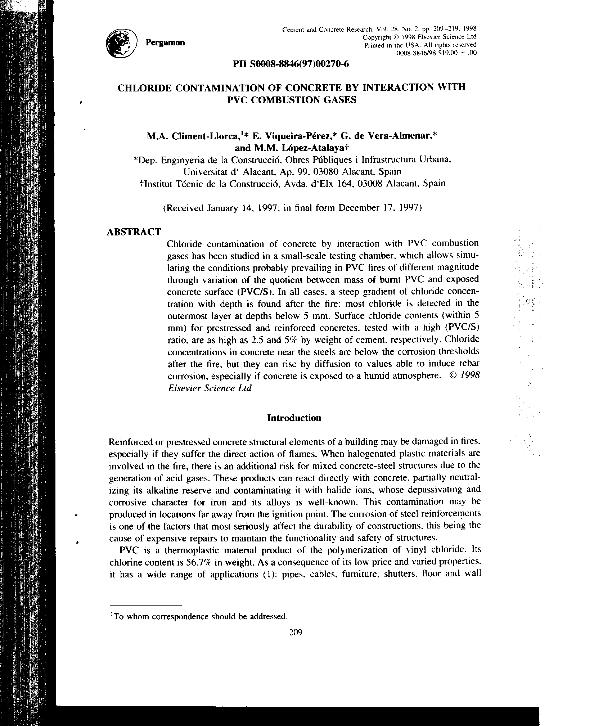Chloride contamination of concrete by interaction with PVC combustion gases

Contenido multimedia no disponible por derechos de autor o por acceso restringido. Contacte con la institución para más información.
| Tag | 1 | 2 | Valor |
|---|---|---|---|
| LDR | 00000nab a2200000 i 4500 | ||
| 001 | MAP20071030313 | ||
| 003 | MAP | ||
| 005 | 20080418122029.0 | ||
| 007 | hzruuu---uuuu | ||
| 008 | 980604s1998 usa|||| | |00010|eng d | ||
| 040 | $aMAP$bspa | ||
| 084 | $a812.2 | ||
| 100 | 1 | $0MAPA20080377441$aCliment Llorca, Miguel Angel | |
| 245 | 1 | 0 | $aChloride contamination of concrete by interaction with PVC combustion gases$cMiguel Angel Climent Llorca... [et al.] |
| 520 | $aChloride contamination of concrete by interaction with PVC combustion gases has been studied in a small-scale testing chamber, which allows simulating the conditions probably prevailing in PVC fires of different magnitude through variation of the quotient between mass of burnt PVC and exposed concrete surface (PVC-S). In all cases, a steep gradient of chloride concentration with depth is found after the fire: most chloride is detected in the outermost layer at depths below 5 mm. Surface chloride contents for prestressed and reinforced concretes, tested with a high ratio, are as high as 2,5 and 5% by weight of cement, respectively. Chloride concentrations in concrete near the steels are below the corrosion thresholds after the fire, but they can rise by diffusion to values able to induce rebar corrosion, especially if concrete is exposed to a humid atmosphere | ||
| 650 | 1 | 1 | $0MAPA20080551292$aIncendios |
| 650 | 1 | 1 | $0MAPA20080585488$aGases combustibles |
| 650 | 1 | 1 | $0MAPA20080553685$aCombustión |
| 650 | 1 | 1 | $0MAPA20080536886$aPVC |
| 650 | 1 | 1 | $0MAPA20080550295$aCorrosión |
| 650 | 1 | 1 | $0MAPA20080619855$aMateriales de construcción |
| 650 | 1 | 1 | $0MAPA20080635374$aComportamiento de los materiales frente al fuego |
| 650 | 1 | 1 | $0MAPA20080572372$aHormigón armado |
| 650 | 1 | 1 | $0MAPA20080610746$aEstructuras de hormigón |
| 650 | 1 | 1 | $0MAPA20080538101$aAcero |
| 700 | 1 | $0MAPA20080377441$aCliment Llorca, Miguel Angel | |
| 740 | 0 | $aCement and concrete research | |
| 773 | 0 | $tCement and concrete research$gVol. 28, nº 2, 1998 ; p. 209-219 |

